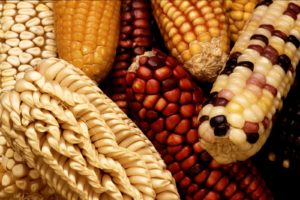Who doesn’t want the food they consume to be better for them, better for others, better for the planet (and possibly be for free)? The ambitious startup PantryPerks is fighting hard to turn the idyllic-sounding situation into reality and have set in motion a campaign offering free, healthy food, alongside supporting the Non-GMOs cause and other charities, simply by rethinking the grocery industry.
Why are they supporting Non-GMOs?
Since their introduction in 1996, GMOs have been consistently hailed as the abracadabra for higher yields, higher profits, fewer pesticides, easier farming, and more nutritious foods. They have also been touted as the solution to meet the challenges of climate change and beat world hunger.
But the lack of research as to their safety for consumers has increasingly raised concerns and begun a public outcry for better research and more transparency.
 The most unsettling aspect of current studies of the long-term effects of GMOs is that most research has been executed by the Biotechnology Companies themselves. Consequently, the research could be painting an overly positive picture of the effects of GMOs, as company-funded scientific researchers have high incentives to disguise or even deny negative findings. It boils down to the very definition of “leaving the fox to guard the hen house”.
The most unsettling aspect of current studies of the long-term effects of GMOs is that most research has been executed by the Biotechnology Companies themselves. Consequently, the research could be painting an overly positive picture of the effects of GMOs, as company-funded scientific researchers have high incentives to disguise or even deny negative findings. It boils down to the very definition of “leaving the fox to guard the hen house”.
According to Non-Profit Organization Non-GMO Project as well as an extended study, “GMOs Myths and Truths”, a British evidence-based examination from 2014, there are at least 3 solid claims that can be made concerning the effects of GMOs:
- GMOs affect health- More than 80% of all genetically modified crops grown worldwide have been engineered for herbicide tolerance. As a result, the use of toxic herbicides has increased fifteenfold since GMOs were first introduced. The World Health Organization itself stated in March 2015 that the commonly used herbicide glyphosate is “probably carcinogenic to humans.”
- GMOs affect the planet – Genetically modified crops are responsible for the emergence of resistant “superweeds” and “superbugs,” which can only be killed with ever more toxic poisons. Once released into the environment, these organisms cannot be recalled and cause an undeniable harm.
- GMOs affect farmers- Biotechnology companies obtain patents to control the use of their genetically engineered seeds. Therefore, they can sue farmers whose fields have been contaminated with GMOs, even when it is the result of the drift of pollen from neighboring fields. This makes them a threat to farmer sovereignty and to the national food security of any country where they are grown.
As a result, more and more citizens are taking matters into their own hands and choosing to opt out of the GMO experiment. A large consumer study from Health Focus International revealed that 87% of consumers globally think non-GMO foods are ‘somewhat’, or ‘a lot’ healthier.
Searching for alternatives
The 2007 founded North American Non-GMO Project is exemplary for this social evolution. The NGO is committed to building and protecting a non-GMO food supply, educating consumers and providing verified non-GMO alternatives.
And they recently started a collaboration with PantryPerks. In this project, PantryPerks donates 6% of customer’s purchases for up to a year to the Non-GMO cause.
The Bay Area startup uses patent-pending technology, a lean supply chain and social commerce, to redistribute traditional margins among consumers and causes like Non-GMO. They want ‘software feeding the world’ rather than ‘software eating the world’ as entrepreneur, investor, and software engineer Marc Andreessen stated 5 years ago in a Wall Street Journal essay.

Rishi Padhi of PantryPerks
In a currently active pilot, the PantryPerks provides cash back to consumers, helping them cover their entire grocery bill with “better-for-you” products, month after month. The idea is simple: consumers get 7% cash back on their own purchases, 6% on purchases made by each friend, and 5% on those made by each friend of a friend. According to its CEO Rishi Padhi, an eBay veteran, “PantryPerks has a dual objective: to make better-for-you products easily discoverable and affordable, and to promote charities and causes.”
True to its objective and apart from the year-long support of 6% to the Non-GMO cause, PantryPerks donates an additional 1% of every transaction to charities that PantryPerks users themselves can nominate.
Padhi was optimistic when commenting on early adopters of the project in a press release, “We are seeing a lot variety across the age spectrum – from students to millennial moms to baby boomers. Our selection of natural, organic and specialty brands of different aids takes care of varied interests. Consumers can filter by specific attributes such as Vegan, Kosher, fair-trade etc. to buy the brands that embody their specific values”.










